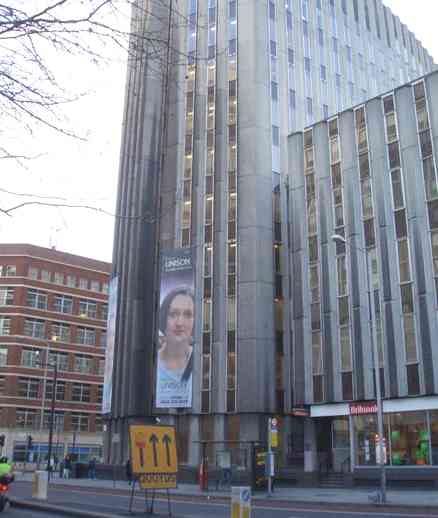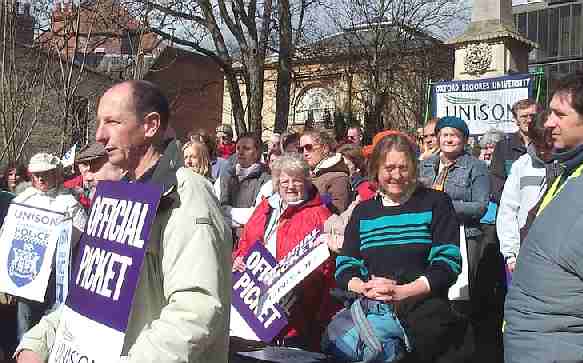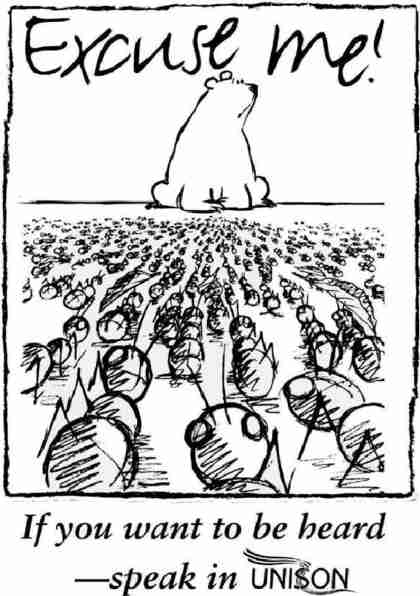|
UNISON
|
|||||||||||||||||||||||||||||||||||||||||||||||||||||||||||||||||
|
HOME | CASE STUDIES | LAW | NEWS | POLITICS | RIGHTS | SCANDAL | SITE INDEX | WHISTLEBLOWING |
|||||||||||||||||||||||||||||||||||||||||||||||||||||||||||||||||
|
UNISON — the Public Service Union is the largest trade union in the United Kingdom, with over 1.3 million members.
It was formed in 1993 when three previous public sector trade unions, the National and Local Government Officers Association (NALGO), the National Union of Public Employees (NUPE) and the Confederation of Health Service Employees (COHSE) merged.
UNISON's current general secretary is Dave Prentis. He was elected on 28 February 2000, and took up the post on 1 January 2001, succeeding Rodney Bickerstaffe who had held the post for five years.
UNISON
Head office
Members and organisation
Members of UNISON are typically from industries within the public sector and generally cover both full-time and part-time support and administrative staff. The majority of people joining UNISON would be workers within areas such as local government, education, the National Health Service, police services, utilities (such as gas, electricity and water), and transport. These 'Service Groups' all have their own national and regional democratic structures within UNISON's constitution.
As a trade union, UNISON provides support to members on work related issues, including protection and representation at work, help with pay and conditions of service and legal advice and representation. Each company or organisation will usually be represented by a particular UNISON branch and members within that organisation elect stewards to represent them. The stewards receive training in workplace issues and are then able to co-ordinate and represent members both on an individual basis and collectively.
Each branch is run by an annually elected committee of members which holds regular meetings, including an annual general meeting for all members to attend. Branches also have access to comprehensive legal advice and support from the network of twelve regional offices. Branches elect delegates to the union's annual National Delegate Conference (held in June every year), the supreme body within the union's constitution with responsibility for setting the union's policies for the forthcoming year.
To
encourage all voices to be heard UNISON has "self organised groups'
of black and minority ethnic members, women members, lesbian, gay,
bisexual & transgender members, and disabled members. Young members
and retired members also have their own sections within the union.
Political work
UNISON is the largest union in the British Trades Union Congress (TUC) and plays an important role in developing TUC policy. It has a big voice too in the Scottish, Welsh and Irish trades union congresses.
UNISON has a political fund which uses money from members for political and social campaigning. Members have the choice of paying into either a fund which supports the Labour Party, a non-affiliated General Political Fund or to opt out of contributing to a political fund at all.
UNISON
also carries out research and campaigns on public service issues, such as
the Private Finance Initiative (PFI). It has also voted (at its 2005
annual conference) to oppose the Government's proposals for a British
national identity card. They plan to ask the Members of Parliament
affiliated to the union to vote against it, on the basis that the scheme
is an intrusion on civil liberties and not a way of stopping terrorism.
UNISON's members would be involved in implementing the cards and
associated database if the scheme goes ahead.
A rally of UNISON in Oxford during the strike on 2006-03-28
Membership Fees
The levels of subscription are determined by the National Delegate Conference and are recorded as a Schedule in the union rules. The National Delegate Conference has the power to vary the subscriptions levied after a majority vote, although the subscription rates do not change frequently.
Local branches may also, after a majority vote of members, impose an additional 'Local Levy' as long as the levy does not exceed one sixth of the subscription payable. This is in addition to the standard rate, and must be used for local branch purposes.
Membership fees vary depending on how frequently members are paid and the level of their current salary (see table). Subscriptions are generally paid by what is commonly known as "check-off" or DOCAS (Deduction of Contributions at Source). This is where the employer deducts the contribution from the employee's salary on behalf of the union. Other payment methods such as direct debits and cheque payment may also be used if the member specifically requests it, or if there is no DOCAS arrangement with the employer.
Student members in full-time education (including student nurses or Modern Apprentices) have a fixed rate subscription of £10 per year.
Members who have had continuous membership for at least two years may opt to pay a one-off fee of £15 upon retirement from paid employment. This allows them to retain the benefits of being a union member for life. They are then classed as 'Retired Members'.
Members who are dismissed or made redundant from employment may retain their membership for £4 per year for a period of up to two years whilst they remain unemployed.
One in a Million Campaign Poster
Publicity Campaigns
Various local and national campaigns are run by the union. Much of the recruitment within organisations takes place at a local level, with stewards and branches directly engaging with the staff within their remit. This tends to be the most effective method of publicising the work of the union.
The national organisation also engages in publicity. Perhaps one of the most famous campaigns was the "Ant & Bear", which was used at the formation of the new amalgamated union. This advertising campaign showed an ant trying to get past a large bear by shouting "Excuse Me", however the bear did not pay attention. The next scene showed the ant being joined by many thousands more, and them all saying "Get out of the way!" together, which does get the bear's attention and makes him move out of the way. (Ants & Bears television commercial)
Ants & Bear Campaign Poster
A more recent campaign in 2005 saw a TV commercial created and broadcast within the UK which shares a similar theme to the original Ants & Bears. In the advert we are shown a woman walking alone through the streets, and as she walks more and more people join in line behind her until there are thousands following her. She then enters an office with a man sitting behind a desk who does not pay any attention to her. She then makes a cough, which is repeated simultaneously by everyone else in the line, shaking the coffee cup on the table. (UNISON television commercial 2005)
This site is protected under Article10 of the European Convention on Human Rights and Fundamental Freedoms.
WE ACCEPT NO RESPONSIBILITY FOR THE ACCURACY OF ANY FEATURED LINKS
| |||||||||||||||||||||||||||||||||||||||||||||||||||||||||||||||||
|
IF YOU HAVE ANY GOOD STORIES TO TELL WE'D LIKE TO HEAR FROM YOU.
With thanks to Action Groups around the world for the supply of real case history and supporting documents.
|
|||||||||||||||||||||||||||||||||||||||||||||||||||||||||||||||||




